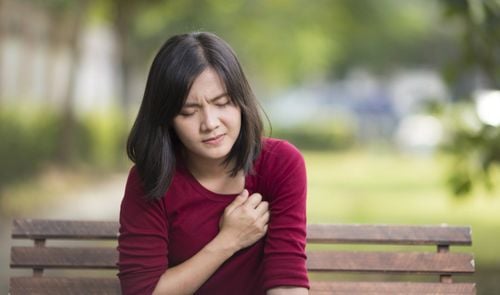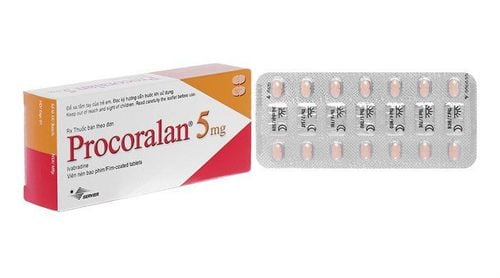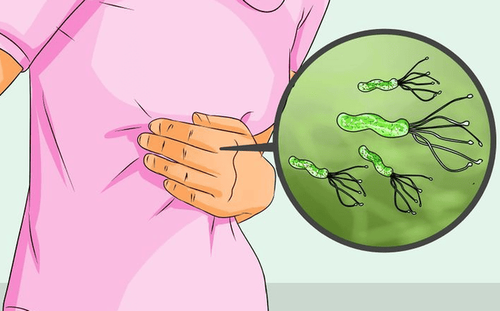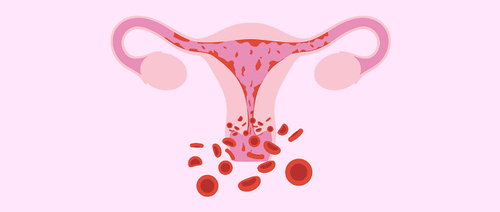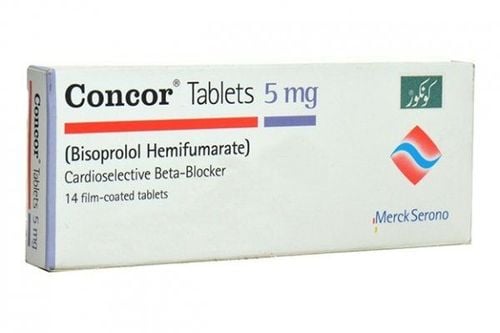This is an automatically translated article.
The article is professionally advised by Tran Hong Nhat Master. Doctor Tran Hong Nhat, Cardiovascular Center of Vinmec Central Park International General Hospital.Heart attack is a manifestation of coronary artery disease, one of the leading causes of death in our country. Learning about heart attack is the way to save your own life. Because when there are signs of a heart attack, calling an ambulance right away is essential. Master. Doctor Tran Hong Nhat, Cardiovascular Center of Vinmec Central Park International General Hospital will share to help you understand more about heart attack and recover from heart attack.
1. Signs of a heart attack
A typical heart attack is sudden and intense, but sometimes it begins with mild pain or discomfort in the chest. So pay attention to your body and when you experience any of the warning signs of a heart attack below, you should see a doctor right away for prompt treatment:Chest pain :
Most heart attacks involve associated with discomfort in the left or mid-chest area. A feeling of sharp pain or tension as if being pressed by a heavy object. The pain in the chest usually lasts a few minutes, it goes away and then comes back again.
It should be emphasized that, not everyone has typical chest pain, the pain can be mild and transient, so it can be ignored or confused with other symptoms such as bloating, indigestion, gastric reflux. In some cases, there may not be any chest pain at all, especially in people with diabetes. So when you want to determine if a person is having a heart attack, it is important to combine symptoms, not just based on the degree of chest pain.
Discomfort in other areas of the body : Pain in the chest often spreads to other parts such as pain spreading to the left hand or both arms, spreading to the back, or neck, jaw.
Accompanying signs : In addition to the classic signs above, a heart attack may also occur with the following signs:
Shortness of breath. Cold sweat. Nausea. Tired, dizzy.
Trắc nghiệm: Bạn có hiểu đúng về huyết áp cao không?
Huyết áp cao còn được gọi là kẻ giết người thầm lặng vì bệnh thường không có triệu chứng. Thiếu hụt kiến thức về huyết áp cao có thể làm cho tình trạng bệnh trở nên trầm trọng hơn. Dưới đây là những câu hỏi trắc nghiệm vui giúp bạn hiểu đúng về bệnh cao huyết áp.2. Causes of heart attack
Causes of heart attack include:2.1. Coronary artery disease: The coronary arteries are the blood vessels that supply blood to the heart. Coronary artery disease is a condition in which the coronary arteries become blocked by cholesterol plaques.
Before a heart attack, the plaques break off to form blood clots, these clots cause blockages, preventing the blood supply to the heart muscle.
Those at high risk include:
Smokers. People with a high-fat diet. Diabetes. High cholesterol. High Blood Pressure. Overweight or obese.

2.3. Hypoxia: In some cases, due to impaired lung function or carbon monoxide poisoning (CO), the heart will receive unoxidized blood, making the heart muscle without oxygen to function, the heart muscle is damaged. damage and cause a heart attack.
3. How to handle a heart attack
When you observe your body showing signs of a heart attack, you need to call 911 immediately. It can be a mistake but it is acceptable compared to the loss of a life if you do not call 911 in time.
When you actually have a heart attack, the heart attack treatment options depend on whether or not you have had a heart attack. Myocardial infarction is the most serious form of heart attack and requires urgent treatment to reduce heart damage.
The treatment used will depend on when symptoms started and if you can get early treatment:
Percutaneous coronary intervention (PCI): This is a treatment that can be treated. First choice for patients with myocardial infarction occurring within 12 hours. A narrowed, closed coronary artery will be dilated with an instrument called a stent. After coronary intervention, it is necessary to use some drugs to prevent thrombosis or re-stenosis such as aspirin, clopidogrel, prasugrel, ticagrelor,... Use of drugs to dissolve blood clots: For cases despite symptoms If the heart attack occurs less than 12 hours, but the percutaneous coronary intervention cannot be performed, blood clot-dissolving drugs such as reteplase, streptokinase, urokinase, etc. Now, the patient may be offered another course of treatment, especially if symptoms have improved. The best course of treatment will be decided by the doctors after the results of the coronary angiogram are available, which may include medication, PCI, or bypass surgery.
4. Recovering from a heart attack
Recovery from a heart attack can take several months, which is a gradual process that should not be rushed. During the recovery period, depending on the extent of the damage from the heart attack, the patient may need physical therapy or just reasonable exercise combined with an appropriate diet.Recovery usually takes place in stages, starting from the hospital until after being discharged the patient can continue to recover at home.
The two most important goals of rehabilitation are: To gradually restore the patient's fitness to be able to resume normal activities and Reduce the risk of another heart attack.
4.1. Exercise: After returning home, patients should rest, avoid vigorous physical activity, and do only light activities, such as walking up and down stairs several times a day or taking short walks. . After a while, the patient can gradually increase the amount of activity. 4.2. Appropriate diet: The patient has a reasonable diet, reducing starch, reducing fat. Eat fruit, eat less meat instead of fish. Replace butter and cheese with vegetable oil products like olive oil. Supplements should not be taken without consulting a doctor or specialist. Some supplements (e.g. beta-carotene) have the potential to be harmful. 4.3. Lifestyle: Do not smoke : If you have ever smoked, the patient should quit smoking for their own health Should not drink alcohol, beer : Drinking a lot of alcohol, and alcoholic beverages increase blood pressure, cholesterol levels and increase your risk of having another heart attack. Research has shown that people who continue to drink alcohol after a heart attack are more than twice as likely to die as people who do not use alcohol. Weight control: If you are overweight or obese, you should lose weight and maintain a healthy weight by combining exercise and a calorie-controlled diet for obese people. Live a healthy lifestyle, use medications as prescribed by your doctor, and have regular health checkups. Monitor your heart attack, if symptoms change or get worse or develop new symptoms, tell your doctor right away.
Currently, Vinmec Central Park is one of the few medical facilities in Vietnam that owns a team of cardiologists with equal qualifications, experience and mastery of cardiovascular treatment techniques. provide superior quality care to patients.
Along with a team of highly specialized doctors, Vinmec Central Park is also equipped with modern machines such as an international standard integrated Hybrid operating room system, 3 Tesla MRI scanners, 640 magnetic resonance imaging machines. sequence, ... has helped diagnose and treat cardiovascular diseases effectively. Have performed emergency coronary intervention, performed complex cardiovascular intervention techniques or performed complex surgery on heart valves, coronary arteries, aortic diseases, peripheral vascular diseases.
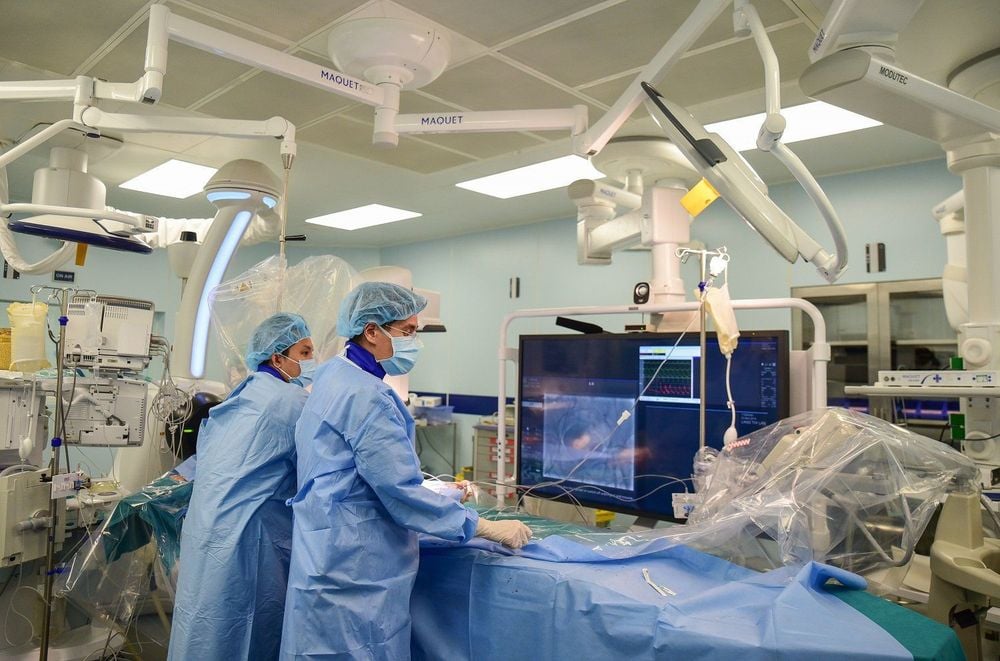
Therefore, it can be said that Vinmec International General Hospital, especially Vinmec Central Park Hospital is the leading private hospital in the treatment of cardiovascular diseases in Vietnam
Please dial HOTLINE for more information or register for an appointment HERE. Download MyVinmec app to make appointments faster and to manage your bookings easily.





